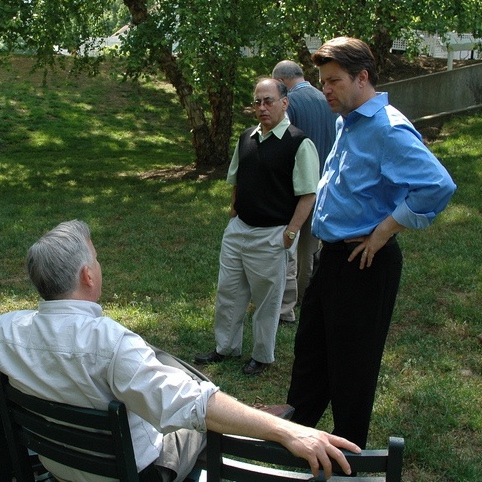Before getting to today’s post, I want to thank Terry Francis for willingly providing today’s guest article. He is doing a fantastic job in our gospel meeting this week. He has been talking to us about Connecting and Conquering, that is, about the importance of congregational unity in order to fight the battles against the real enemy. As of the posting of this article, he has two lessons to go. Tuesday, October 13, at 7 pm, his lesson is entitled, “Danger Ahead!” and discusses what churches need to do when fellowship breaks down. The first three lessons all focused on how to be united in the face of the battle, this one takes a look at what to do when the fellowship starts to break down. Then on Wednesday, October 14, at 7 pm, his lesson is entitled “Love Will Keep Us Together.” We’ll look at how we can love each other as Jesus loved us so we can fight the enemy and not each other. Hope you can make it.
And now for the post:
Nathan and David: Confronting a Friend
 It must have been frightening. The historical account doesn’t detail how Nathan was directed—it simply says, “Then the Lord sent Nathan to David…” (2 Sam. 12:1). Nathan wasn’t to confront just any man about his sins—he was sent to confront the king of Israel. Who would dare rebuke a king? But how could Nathan dare say “No” to God? Nathan’s acceptance of God’s command resulted in one of the most familiar confrontations ever recorded in scripture.
It must have been frightening. The historical account doesn’t detail how Nathan was directed—it simply says, “Then the Lord sent Nathan to David…” (2 Sam. 12:1). Nathan wasn’t to confront just any man about his sins—he was sent to confront the king of Israel. Who would dare rebuke a king? But how could Nathan dare say “No” to God? Nathan’s acceptance of God’s command resulted in one of the most familiar confrontations ever recorded in scripture.
The scriptures suggest that Nathan was more than just a prophet of God. Nathan was informed of David’s desire to build God a temple (2 Sam. 7). David’s second son was possibly named after the prophet Nathan (2 Sam. 5:14). Nathan named David’s second son by Bathsheba (2 Sam. 12:25). Nathan remained loyal to David during the rebellion of Adonijah and anointed Solomon as king (1 Kings 1). The Lord didn’t just send a prophet to confront David, He sent a friend.
It was Nathan’s relationship with David that formed his approach. David had gone to great lengths to cover up his iniquity. Meanwhile, God had been preparing David’s heart for the confrontation ahead. David wrote, “For when I kept silent, my bones wasted away through my groaning all day long. For day and night your hand was heavy upon me; my strength was dried up as by the heat of summer” (Psalm 32:3–4). God’s heavy hand no doubt softened the calloused heart of the king, but it was the well-crafted approach of a friend that pricked his heart. Notice the wisdom of Nathan’s approach:
Nathan used David’s experience as a shepherd (2 Sam. 12:3–4).
The choice of a lamb was purposeful. Who could deny that? Nathan appealed to the heart of the shepherd boy turned king. If anyone understood the love for a special lamb, it would be the former shepherd.
Nathan appealed to David’s wisdom and judgment (2 Sam. 12:1–6).
As king, David had judged numerous times for the people. He served as the equivalent of today’s Supreme Court hearing and judging the most difficult cases. While David’s personal life was plagued by guilt and misery resulting from sin, the king was still capable of executing righteous judgment. Nathan understood this and appealed to David’s judgment.
Nathan appealed to David’s knowledge of the Law.
The subject of Nathan’s story violated a number of Mosaic Laws. He violated the tenth commandment, which forbids one from coveting anything belonging to his neighbor (Ex. 20:17). David’s pronounced judgment of restoring the lamb fourfold was a direct application of Exodus 22:1, “If a man steals an ox or a sheep, and kills it or sells it, he shall repay five oxen for an ox, and four sheep for a sheep.” As David’s friend, Nathan understood the king’s knowledge of the Law.
It was Nathan’s knowledge of his friend that equipped him to confront David with great wisdom. David’s anger was quickly aroused as he pronounced his righteous judgment. He failed to see that he had sought to remove the speck from another’s eye while a beam extended from his own (Matt. 7:1–5). Nathan responded to David, “You are the man!” (2 Sam. 12:7). David had pronounced judgment on himself. His God-softened heart had finally been defeated by the loving rebuke of his friend. He responded with a penitent heart (2 Sam. 12:13).
Nathan was the best friend David ever had. Nathan could have defended his friend. He could have attempted to justify the sins of David. But rather than cower before the king, Nathan rose to the challenge and helped turn his friend back to God. James wrote, “My brothers, if anyone among you wanders from the truth and someone brings him back, let him know that whoever brings back a sinner from his wandering will save his soul from death and will cover a multitude of sins” (James 5:19–20). Nathan saved David’s soul from death. That’s friendship! The wise man said, “A friend loves at all times, and a brother is born for adversity” (Prov. 17:17). The darkest hours of life reveal the greatest friendships.
We need to learn from David. Rather than respond with bitterness towards Nathan, David saw the love of a friend. He responded with godly sorrow that produced repentance. He understood what courage it must have taken for his friend to confront him. We should seek to imitate David’s response to a rebuke.
We also need to learn from Nathan. True friendship is manifested in the willingness to save a friend’s soul despite the risks. Nathan knew his rebuke of the king could have cost him a friendship and possibly his life. He was willing to risk it all to save the king—to save his friend.
-by Terry Francis

 Sunday Morning In-Person Service is Canceled
Sunday Morning In-Person Service is Canceled